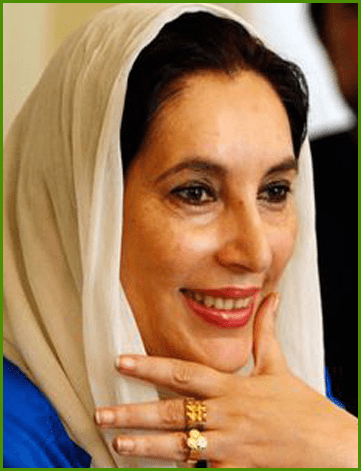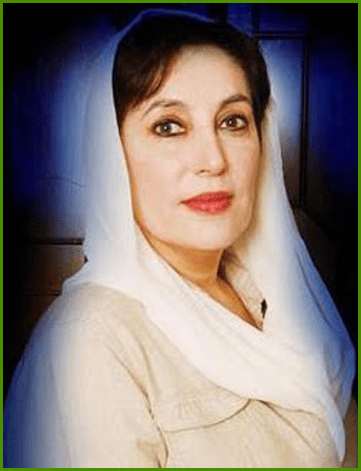Articles
15 Years On: The lives Benazir left behind
On the anniversary of that terrible afternoon of December 27 in Pakistan, when one minute Benazir Bhutto, 54, was waving to crowds after an election rally and the next she was lying slumped on the floor of her vehicle, her widower and children went to give blood, as they vow to do every year. At the family home in Dubai, where she lived in exile, Benazir’s bedroom is locked. On the bedside table sits the manuscript of a book she finished writing a day before she was killed. “I sleep in the next room, because the children and I don’t want to lose her scent,” says her widower, Asif Ali Zardari.
On that fateful day in 2007, he and the children were in Dubai when they got a phone call saying Benazir was hurt. Zardari bitterly regrets that his wife refused to let him do the campaigning after she narrowly avoided a bombing in October. “I told her to bunker down after that and I’d take over. But she didn’t want anything to happen to me.”
That Zardari, 53, is now Pakistan’s president is a remarkable turnaround, even by the standards of South Asia’s dynastic politics. For years he was the country’s most despised man, known as Mr 10% for his alleged corrupt activities while his wife was prime minister; he spent 11 years in jail, though he was never convicted. Later, his refusal to allow a postmortem, and the sidelining of some of those closest to Bhutto, even led to wild speculation that he was involved in her death.
Many of Benazir’s colleagues were shocked by her will, which named their 20-year-old son, Bilawal, her political heir, with Zardari as joint leader of her Pakistan Peoples Party (PPP) until Bilawal is ready to take over. Since its reading, Zardari, who keeps the handwritten will framed on the wall, has proved to be a remarkably skilled politician. “I had a great teacher,” he smiles ruefully. “Why would she leave it to me if she didn’t think I was fit enough?”
It is an unenviable legacy. When Benazir was killed she was still building a mausoleum for her father, Zulfikar Ali Bhutto, who founded the PPP and was executed. Now her body lies there, alongside her brothers, both of whom were murdered. “I know I’m in danger. I can feel it,” says Zardari. “One father, two brothers, thousands killed and imprisoned; that’s what PPP’s about. Whoever killed her wants to kill me.”
And yet Zardari’s government has launched no inquiry, insisting that only the UN has the capacity to investigate. “The problem is larger than anyone thinks,” he says. Citing Bhutto’s own words — “Democracy is the best revenge” — he adds: “I don’t want nine people strung up to avenge her death. It’s the whole system. Only when we’re Singapore and prospering will she be avenged.”
That moment seems far off. Pakistan is almost bankrupt. The country is so plagued by terrorism that it vies with Iraq for the largest number of suicide bombings. With so many problems, Zardari admits he finds it hard to be a single father to teenagers he barely knows.
“I have to get to know my children again,” he says. “I find their pain over their mother the hardest thing.”
Their eldest son, Bilawal, is now in his second year at Oxford, where he lives amid tight security. Bakhtawar, the eldest daughter, started at Edinburgh University in September. Both were toddlers when Zardari first went to jail. He was in prison when their daughter, Asifa, now 15, was born. She remains in school in Dubai. Bakhtawar, a talented rap singer, wrote a song about her mother, but Zardari can’t bear to listen to it. Nor has he read Bhutto’s book. “I’m too weak. We mourn her as long as I’m alive,” he says.
Zardari has little time for his own grief. “I need hibernation for at least three years, and don’t have the luxury to do that. But Benazir is all around. I dream about her and wake expecting her to come in. But I don’t think she’d be unhappy. I think she’s looking at us now, saying, ‘Tell me, Asif, now do you think it’s easy?’ “
(Report by Christina Lamb for Times Online)


Editorial Defining President Musharraf's 'turmoil'
The Supreme Court is getting ready to hear a number of petitions against the National Reconciliation Ordinance (NRO) and has named a bench of judges along with known jurists as amici curiae to match the “seriousness” which the NRO has assumed in the public eye. As the court announced that it would start hearing the case after 21 days, Chief Justice Iftikhar Muhammad Chaudhry has clarified that till the pronouncement on corruption cases involved is made, no benefits will accrue to the affected parties.
The reactions to the new development have been interesting. President General Pervez Musharraf has repeated his “request” to Ms Benazir Bhutto to postpone her return to Pakistan to avoid “turmoil” – his chosen word to express a complex problem. He says he has not received Ms Bhutto’s reaction to his request, but the PPP spokespersons have already rejected the request, and preparations are on to welcome her in Karachi amid massive security measures after Al Qaeda, as conveyed through its deputy Baitullah Mehsud, threatened to kill her.
The “turmoil” the president wants to avoid is politically complex. It is not so much Al Qaeda he is currently dreading because that is a longer-term problem; nor can he be expected to ruminate too much on the personal safety of Ms Bhutto. It is the “turmoil” that is brewing inside the party he has been propping up and canvassing for quite blatantly over the past months, the PMLQ and its anti-PPP partners in power. While the attorney general, Malik Muhammad Qayyum, says the NRO will be implemented because it has not been “stayed” by the Supreme Court, the PMLQ leaders most upset by the prospect of facing a PPP led personally by Ms Bhutto consider the NRO as already defunct.
The Supreme Court is getting ready to hear a number of petitions against the National Reconciliation Ordinance (NRO) and has named a bench of judges along with known jurists as amici curiae to match the “seriousness” which the NRO has assumed in the public eye. As the court announced that it would start hearing the case after 21 days, Chief Justice Iftikhar Muhammad Chaudhry has clarified that till the pronouncement on corruption cases involved is made, no benefits will accrue to the affected parties.
The reactions to the new development have been interesting. President General Pervez Musharraf has repeated his “request” to Ms Benazir Bhutto to postpone her return to Pakistan to avoid “turmoil” – his chosen word to express a complex problem. He says he has not received Ms Bhutto’s reaction to his request, but the PPP spokespersons have already rejected the request, and preparations are on to welcome her in Karachi amid massive security measures after Al Qaeda, as conveyed through its deputy Baitullah Mehsud, threatened to kill her.
The “turmoil” the president wants to avoid is politically complex. It is not so much Al Qaeda he is currently dreading because that is a longer-term problem; nor can he be expected to ruminate too much on the personal safety of Ms Bhutto. It is the “turmoil” that is brewing inside the party he has been propping up and canvassing for quite blatantly over the past months, the PMLQ and its anti-PPP partners in power. While the attorney general, Malik Muhammad Qayyum, says the NRO will be implemented because it has not been “stayed” by the Supreme Court, the PMLQ leaders most upset by the prospect of facing a PPP led personally by Ms Bhutto consider the NRO as already defunct.
The old hackles are rising and the country is once again getting ready to settle into its crippling polarities. As passions begin to run on familiar lines, a report says that the tomb of the founder of the PPP, Zulfikar Ali Bhutto at Naodero in Sindh, carries abusive graffiti against him. The Sindh chief minister has been most aggressive in his dislike of the “reconciliation” the president is bent upon effecting with Ms Bhutto. He sees a new political combination coalescing between the PPP and the MQM and finds himself once again consigned to the limbo of Tharparkar with acts of omission and commission during his tenure returning to haunt him.
Reflexes in the PMLQ have also sharpened after realising that, despite all kinds of passionate condemnation in the media, the PPP is bound to retain its hold over 30 percent of the electorate, which can manifest itself in all sorts of ways in the January 2008 general elections. So the PMLQ leaders are basking in the media-unleashed furore that the NRO has “let the corrupt run away with public money”. They want to scuttle the efforts being made by a besieged President Musharraf to widen his political support-base as he fights his lonely battle against Al Qaeda in the Tribal Areas.
Media anchors have typically glossed over the origin of the corruption cases in Pakistan and have carried along the “moral outrage” expressed by those supporting the Lal Masjid revolt and the lawyers’ movement, as they once again go into paroxysms over the NRO. The hype has been so intense that public opinion is now totally geared to the tribal trait of “honour” rather than the democratic condition of “compromise”. There is no regard paid to the need of safeguarding the country’s bipartisan system. A “rejectionism” which will ultimately go in favour of the extremist elements informs the thinking encouraged by the media in Pakistan. “Deal” is a swear word presented as such in the publicity “inserts” of one dominant TV news channel.
The love of confrontation and conflict is on the upswing in Pakistan. Apparently, the only way our “honour” can be saved is by refusing to agree to political compromise and reconciliation. Everyone wants martyrdom without any solution based on the democratic acceptance of “imperfections”; no one thinks of the meagre resource of talent and wisdom in the country’s political system. The tired myth of the “unerring wisdom of the 160 million people” is being repeated by all and sundry on TV channels, without admitting that the 160 million have repeatedly elected the same corrupt politicians again and again, giving the lie to the claim made in their favour.
